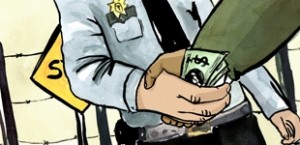Matt Boardman is currently doing an internship at Transparency International’s Defence and Security Programme, and studies History at the University of Cambridge. He has been researching into police corruption and reform.
Transparency International’s In Focus article from 4th August notes that the future of post-conflict countries ‘depends to a large extent on the creation of law enforcement that people can trust’. But it isn’t just in fledgling democracies that the police need public faith, and we should avoid the mistake of forgetting that even long-established trust can be lost.
- The 1991 beating of Rodney King by police officers not only prompted outrage around the world, but sparked the worst riots in Los Angeles’ history.
- In China in 2003, public trust in the police was shaken when a three-year old starved to death in her home because officers refused to go back for her after detaining her mother.
- The recent News of the World scandal in the UK represented a gross abuse of law by the media, but it is the involvement of high-level police officers that is most serious because they represent the body that is responsible for upholding the law itself.
 Because the entire system of policing is founded on force, a force that can do considerable damage if misdirected, the trust of the public is crucial to its authority. Many citizens will never have direct contact with the police, but grant them the trust to use powers that are strictly forbidden to most: to search, to detain, and in some cases, to kill. However, if the police do not use these powers fairly, either as protector or as punisher, then trust is lost and their very ability to police can be crippled as a result.
Because the entire system of policing is founded on force, a force that can do considerable damage if misdirected, the trust of the public is crucial to its authority. Many citizens will never have direct contact with the police, but grant them the trust to use powers that are strictly forbidden to most: to search, to detain, and in some cases, to kill. However, if the police do not use these powers fairly, either as protector or as punisher, then trust is lost and their very ability to police can be crippled as a result.
Corruption within the police might not be easy to combat, but experience in tackling defence sector corruption shows that it is possible to significantly reduce it, if not eliminate it entirely. Steps can be taken to reduce its prevalence, to stop vulnerable police officers from becoming corrupt, and to maintain the trust of the people in its processes.
- Governments can create dedicated anti-corruption units with effective legal powers and ensure that the recommendations of independent commissions on corruption are properly enacted.
- Internal administration systems can reduce the temptation of ‘petty’ corruption by increasing wages, by focusing on ethics in training programmes and by monitoring the assets and records of all officers at regular intervals: particularly those in ‘vulnerable’ areas.
- The international community can help by sharing expertise and initiating reforms: for example, the ‘Eupol’ mission in Afghanistan.
- Civil society organisations can help by leading campaigns and running support networks to tackle the worst effects of police corruption.
Another widely-attempted way to regain and consolidate the public’s confidence is to invite them to participate in ‘community policing’. But experiments in community involvement, while offering some positive effects, can be unhelpful in the long-term. For example, in New South Wales in the early 1990s ‘community policing’ actually intensified racial discrimination as police resented having to ‘adapt’ to local communities. In Venezuela, Hugo Chávez’s policy of communal involvement has reportedly led to instances of vigilante justice.
In the UK, a law granting local communities the power to elect chiefs of police has recently been rejected following criticisms that it might give police officers ‘political labels’. Although the people’s trust must be secured, involving them directly might not be the best way to guarantee far-sighted reform. Arguably, in an area reeling from stories of police corruption, the next chief constable elected is likely to be the one who promises tough and immediate action. Tough action makes satisfying headlines, but as Prof. Maurice Punch warned in 1994, it can cause resentment, waste resources on scapegoating, and does not produce reform that truly lasts.
Corruption in the police is a serious issue. Only rarely will it destroy lives, at least in the Western world. But if any cracks show in the often translucent window of police accountability then vital trust in the police can be shattered.
Arguably, only with far-sighted reform based on holistic, structural change and careful monitoring can police forces restore public trust after the scandal of corruption has hit: not by trying to involve citizens on every level, but by demonstrating with renewed energy that fairness and justice will be upheld by a professional body invested with the highest, and potentially most damaging, of powers.















 Connect with us on Facebook
Connect with us on Facebook Follow us on Twitter
Follow us on Twitter